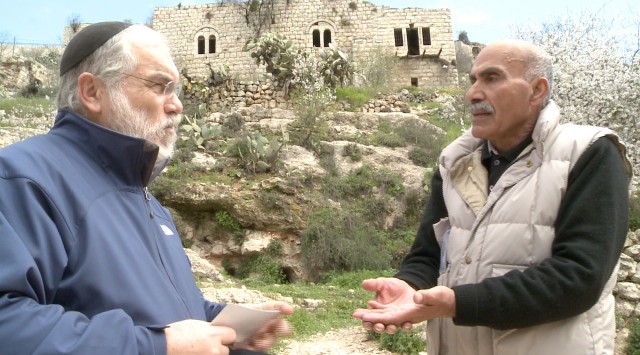
Menachem Daum and Yacoub Odeh discuss a different aspect of the Israeli-Palestinian conflict in THE RUINS OF LIFTA
THE RUINS OF LIFTA: WHERE THE HOLOCAUST AND NAKBA MEET (Menachem Daum & Oren Rudavsky, 2016)
Lincoln Plaza Cinema
1886 Broadway at 63rd St.
Opens Friday, September 23
212-757-2280
www.lincolnplazacinema.com
www.firstrunfeatures.com
 Menachem Daum and Oren Rudavsky’s The Ruins of Lifta: Where the Holocaust and Nakba Meet is built on a faulty premise, but the film still manages to be a rather provocative and intriguing documentary. In their previous collaboration, Hiding and Seeking: Faith and Tolerance after the Holocaust, Rudavsky and Daum examined Daum’s relationship with his parents, Polish Jews who survived the Holocaust and taught Daum to distrust all non-Jews. Their latest film takes viewers to Lifta, the historic but now crumbling Palestinian village at the western entrance to Jerusalem that was abandoned during the 1948 war and has never been resettled by Palestinians or taken over by Israelis. A recent plan calls for it to be razed in order to make way for luxury villas. “Its ruins bear witness to the history of the Israeli-Palestinian conflict,” Daum, an Orthodox Jew, says about the village. “The story told by Lifta’s ruins challenges the narrative that I, the son of Holocaust survivors, believed in for most of my life.” Daum meets with members of the Coalition to Save Lifta, a small group of Jews and Palestinians, including cofounder Daphna Golan, Ilan Shatyer, and Yacoub Odeh. Daum also speaks with historians Benny Morris and Hillel Cohen and Palestinian lawyer Sami Arshid, who offer different perspectives on the conflict.
Menachem Daum and Oren Rudavsky’s The Ruins of Lifta: Where the Holocaust and Nakba Meet is built on a faulty premise, but the film still manages to be a rather provocative and intriguing documentary. In their previous collaboration, Hiding and Seeking: Faith and Tolerance after the Holocaust, Rudavsky and Daum examined Daum’s relationship with his parents, Polish Jews who survived the Holocaust and taught Daum to distrust all non-Jews. Their latest film takes viewers to Lifta, the historic but now crumbling Palestinian village at the western entrance to Jerusalem that was abandoned during the 1948 war and has never been resettled by Palestinians or taken over by Israelis. A recent plan calls for it to be razed in order to make way for luxury villas. “Its ruins bear witness to the history of the Israeli-Palestinian conflict,” Daum, an Orthodox Jew, says about the village. “The story told by Lifta’s ruins challenges the narrative that I, the son of Holocaust survivors, believed in for most of my life.” Daum meets with members of the Coalition to Save Lifta, a small group of Jews and Palestinians, including cofounder Daphna Golan, Ilan Shatyer, and Yacoub Odeh. Daum also speaks with historians Benny Morris and Hillel Cohen and Palestinian lawyer Sami Arshid, who offer different perspectives on the conflict.
The mistake Daum makes is drawing parallels between Odeh, who was expelled along with the rest of the Palestinians in 1948, and Holocaust survivor Dasha Rittenberg, creating a false equivalency between the Nazis’ Final Solution that murdered six million Jews and the Nakba, the exile of the Palestinians. “The Holocaust and Nakba narratives are not exclusive. I do not have to choose between them,” Daum says as he attempts to bring the outspoken and angry Odeh and the calmer, soft-spoken Rittenberg together, as if their rapprochement might signal the possibility of a larger peace between the Jews and the Palestinians. But it is clear early on that Odeh is never going to be satisfied, which serves as a microcosm of any potential agreements about land and self-rule in Jerusalem. In his previous film, Colliding Dreams, made with Joseph Dorman, Rudavsky (A Life Apart: Hasidism in America) examined Zionism and Palestine’s history, specifically how Palestine did not belong to the British to give to the Jews when other people were already living there. In his director’s statement, Rudavsky explains, “We all need to throw Hail Mary passes on the subject of peace in Israel and this is our Hail Mary pass. If we don’t try — each and every one of us — to understand each other — then the future may truly be hopeless.” Although it might be a misguided pass — and one named after a Catholic prayer — in a game that seems to never end, The Ruins of Lifta still raises some important questions and is likely, at numerous moments, to stoke viewers’ ire.